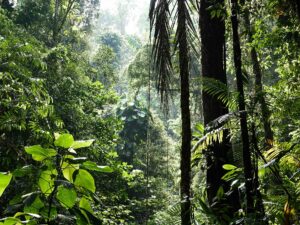Biodiversity loss and climate change are the most critical global threats facing humans. Coordinated climate action is fundamental to avoiding detrimental impacts on the environment and the numerous services and benefits within it that we rely on. There are many interconnections between climate change and biodiversity, demanding that we consider the importance of biodiversity in climate change policies, projects, and discussions.
 Role of biodiversity
Role of biodiversity
Biodiversity encompasses genetic diversity, the variations within a species; species diversity, variations of different species; and ecosystem diversity, variations of ecosystems. Intact ecosystems provide a multitude of services to humans such as provisioning services that supply food and regulating services that modify climate and hydrology. Conserving, restoring, and managing ecosystems can play a key role in climate change mitigation through processes such as carbon sequestration. Such processes can also be beneficial for climate change adaptation and buffering the impact of climate change on societies. For example, seagrass meadows provide natural protection against extreme weather.
Climate breakdown due to biodiversity loss and ecosystem degradation undermines these valuable services. Ecosystems have a tipping point, once this threshold has been surpassed the damage to the ecosystem is irreversible. Combined pressures can lower these thresholds, such as land-use change coupled with over-exploitation and the effects of climate change. Generally, ecosystems are more resilient if they are more diverse. A greater diversity of species means the ecosystem is more likely to have species with a range of tolerances and sensitivities, increasing the chances of the ecosystem functioning under various stressors. Managing ecosystems can have significant impacts on biodiversity, and in turn, the long-term effectiveness of ecosystem services.
Interconnections
Effective climate action requires consideration of the role and impacts on ecosystem services and biodiversity. Wetland and forest ecosystems are important carbon sinks. It has been estimated that terrestrial vegetation stores approximately 450-650 gigatonnes of carbon. As these ecosystems are converted and degraded through unsustainable human activities, the carbon dioxide being stored is released into the atmosphere. Sustainable ecosystem management reduces and prevents the volume of greenhouse gas emissions being released into the environment, which contribute to climate change and global warming.
 Ecosystem-based adaption encompasses approaches that support and enable people to adapt to climate change through biodiversity and ecosystem services. Restoring, conserving, and sustainably managing ecosystems can reduce a community’s vulnerability to climate impacts such as rising sea levels, droughts, and hurricanes. Preserving ecosystems ensures their resilience and longevity, providing alternate livelihood options in response to climate change.
Ecosystem-based adaption encompasses approaches that support and enable people to adapt to climate change through biodiversity and ecosystem services. Restoring, conserving, and sustainably managing ecosystems can reduce a community’s vulnerability to climate impacts such as rising sea levels, droughts, and hurricanes. Preserving ecosystems ensures their resilience and longevity, providing alternate livelihood options in response to climate change.
Effective climate action
Opportunities to promote change adaption, mitigation, and biodiversity benefits exist but they must be effectively implemented. Poor conceived and executed climate change interventions could harm biodiversity and potentially reduce their resilience to climate change. For example, tree planting has numerous benefits, but if only one species is planted, the opportunities for biodiversity, carbon sequestration, and ecosystem services are limited. The opportunities for local communities also become limited. Climate change adaption must consider biodiversity to avoid further adverse effects. For example, building a dam in response to floods could negatively impact the ecology of the river, disrupting fishing, and in turn impacting food security and the local community who are reliant on the food source. Instead, a suitable alternative could be restoring floodplains, this promotes biodiversity conservation and nutrient retention while potentially mitigating climate change.
 By protecting, managing, and restoring natural and managed ecosystems, we can preserve the planet’s biodiversity and the benefits it provides. In turn, this will enhance carbon sinks and reduce the volume of greenhouse gases entering the atmosphere, mitigating climate, change and global warming. We are at a critical point where if we don’t change our actions, we’ll lose millions of species and the unique ecosystems they inhabit. We will not only lose the biodiversity that has evolved on our planet over millions of years but also the services that allow us to survive.
By protecting, managing, and restoring natural and managed ecosystems, we can preserve the planet’s biodiversity and the benefits it provides. In turn, this will enhance carbon sinks and reduce the volume of greenhouse gases entering the atmosphere, mitigating climate, change and global warming. We are at a critical point where if we don’t change our actions, we’ll lose millions of species and the unique ecosystems they inhabit. We will not only lose the biodiversity that has evolved on our planet over millions of years but also the services that allow us to survive.






